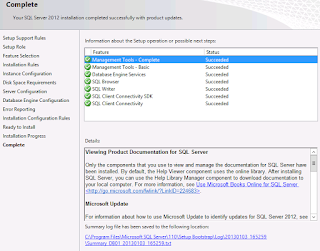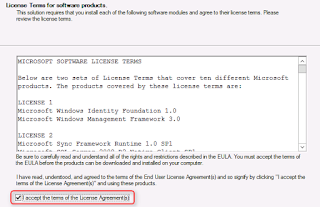I will install SharePoint 2013 in the following lab environment.
Computer FQDN: DC01.contoso.com
IP address / network: 192.168.7.10/24
Roles: Domain Controller, DNS server, Global Catalog server
OS: Windows Server 2012 Datacenter
Computer FQDN: SP01.contoso.com
IP address / network: 192.168.7.11
Roles: SharePoint 2013 server
OS: Windows Server 2012 Datacenter
Computer FQDN: DB01.contoso.com
IP address / network: 192.168.7.12
Roles: SQL Server 2012 standard server with service pack 1
OS: Windows Server 2012 Datacenter
Service accounts for installing SharePoint 2013
To install SharePoint 2013, we need to create the following accounts in Active Directory.
| Account Name | Usage |
|---|---|
SPAdmin
|
SharePoint 2013 installation and Farm Administrator account (Local Administrator of SP01) |
SPFarmSvc
|
SharePoint 2013 Farm account |
SPSQLAdmin
|
SQL Server 2012 administrator (Local Administrator of DB01) |
SPSQLSvc
|
SQL service account |
Installing SQL Server 2012
1. On DB01, log in as SPSQLAdmin.
2. Insert SQL Server 2012 standard DVD.
3. Run "Setup.Exe".
4. On "SQL Server Installation Center", click "Installation > New SQL Server stand-alone installation or add features to an existing installation".
5. On "Setup Support Rules" window, click "OK".
6. On "Product Key" window, click "Next".
7. On "License Terms" window, check "I accept the license terms".
8. Click "Next".
9. On "Setup Support Rules" window, click "Next".
10. On "Setup Role" window, select "SQL Server Feature Installation", click "Next".
11. On "Feature Selection" window, check "Database Engine Services", "Management Tools - Basic" and "Management Tools - Complete".
12. Click "Next" twice.
13. On "Instance Configuration" window, select "Named instance" and then type "SP13SQL".
14. Click "Next" twice.
15. On "Server Configuration" window, type "Contoso\SPSQLSvc" in "Account Name" of "SQL Server Agent" and "SQL Server Database Engine".
16. Type the password of "Contoso\SPSQLSvc" in "Password" of "SQL Server Agent" and "SQL Server Database Engine".
17. Change the "Startup Type" of "SQL Server Agent" to "Automatic".
18. Click "Next".
19. On "Database Engine Configuration" window, select "Windows authentication mode" and then click "Add Current User".
20. Click "Next".
21. On "Error Reporting" window, click "Next".
22. On "Installation Configuration Rules" window, click "Next".
23. On "Ready to Install" window, click "Install".
24. On "Complete" window, click "Close".
Configuring the SQL Server for set up SharePoint 2013
1. On DB01, log in as SPSQLAdmin.
2. Launch "Microsoft SQL Server Management Studio".
3. Click "Connect".
4. Right-click "Security", select "New > Login".
5. Next to "Login name", type "Contoso\SPAdmin".
6. On left pane, select "Server Roles".
7. Add "dbcreator" and "securityadmin" under Server roles.
8. Click "OK".
9. Right-click "DB01\SP13SQL", select "Properties".
10. On left pane, select "Advanced".
11. Next to "Max Degree of Parallelism", change to "1".
12. Click "OK".
Remark: If "Max Degree of Parallelism" setting hasn't been changed, you may get the following error when you perform SharePoint Products Configuration wizard.
Installing prerequisites tools of SharePoint 2013
The SharePoint server requires accessing Internet to download and install the prerequisites tools. If the SharePoint server can access Internet. We need to download and install the prerequisites tools by ourselves.
To download the prerequisites tools, please go to the following web site:
http://technet.microsoft.com/en-us/library/cc262485.aspx
1. On SP01, log in as SPAdmin.
2. Insert SharePoint 2013 DVD.
3. Click "Run splash.hta".
4. Click "Install software prerequisites".
5. On "Welcome to the Microsoft SharePoint 2013 Products Preparation Tool" window, click "Next".
6. On "License Terms for software products" window, check "I accept the terms of the License Agreement(s)", click "Next".
The prerequisites tools are downloading in the server.
You may need to restart the server a few times.
7. On "Installation Complete" window, click "Finish".
Installing SharePoint 2013
1. On SP01, log in as SPAdmin.
2. Run "splash.hta".
3. Click "Install SharePoint Server".
4. On "Enter your Product Key" window, enter the product key, click "Continue".
5. On "Read the Microsoft Software License Terms" window, check "I accept the terms of this agreement", click "Continue".
6. On "Server Type" window, select "Complete", click "Install Now".
7. On "Run Configuration Wizard" window, check "Run the SharePoint Products Configuration Wizard now", click "Close".
8. On "Welcome to SharePoint Products" window, click "Next".
9. On pop-up window, click "Yes".
10. On "Connect to a server farm" window, select "Create a new server farm", click "Next".
11. On "Specify Configuration Database Settings" window, next to "Database server" type "DB01\SP13SQL".
12. Next to "Username", type "Contoso \SPFarmSvc".
13. Next to "Password", type the password of "Contoso \SPFarmSvc".
14. Click "Next".
"Specify Database Access Account" is the SharePoint farm service account which is used as the application pool identity for Central Administration and as the process account for SharePoint Foundation 2013 Timer service.
15. On "Specify Farm Security Settings" window, provide a password for "Passphrase".
"Passphrase" is used to joining the SharePoint farm by other SharePoint servers.
16. Click "Next".
17. On "Configure SharePoint Central Administration Web Application" window, check "Specify port number".
18. Next to "Configure Security Settings", select "NTLM".
19. Click "Next".
20. On "Completing the SharePoint Products Configuration Wizard" window, click "Next".
21. On "Configuration Successful" window, click "Finish".
Reference:
Initial deployment administrative and service accounts in SharePoint 2013
Account permissions and security settings in SharePoint 2013
You Shall Configure your MAXDOP When Using SharePoint 2013
Hardware and software requirements for SharePoint 2013
1. On DB01, log in as SPSQLAdmin.
2. Insert SQL Server 2012 standard DVD.
3. Run "Setup.Exe".
7. On "License Terms" window, check "I accept the license terms".
9. On "Setup Support Rules" window, click "Next".
13. On "Instance Configuration" window, select "Named instance" and then type "SP13SQL".
15. On "Server Configuration" window, type "Contoso\SPSQLSvc" in "Account Name" of "SQL Server Agent" and "SQL Server Database Engine".
16. Type the password of "Contoso\SPSQLSvc" in "Password" of "SQL Server Agent" and "SQL Server Database Engine".
17. Change the "Startup Type" of "SQL Server Agent" to "Automatic".
19. On "Database Engine Configuration" window, select "Windows authentication mode" and then click "Add Current User".
21. On "Error Reporting" window, click "Next".
22. On "Installation Configuration Rules" window, click "Next".
1. On DB01, log in as SPSQLAdmin.
2. Launch "Microsoft SQL Server Management Studio".
3. Click "Connect".
4. Right-click "Security", select "New > Login".
7. Add "dbcreator" and "securityadmin" under Server roles.
9. Right-click "DB01\SP13SQL", select "Properties".
11. Next to "Max Degree of Parallelism", change to "1".
Remark: If "Max Degree of Parallelism" setting hasn't been changed, you may get the following error when you perform SharePoint Products Configuration wizard.
Installing prerequisites tools of SharePoint 2013
The SharePoint server requires accessing Internet to download and install the prerequisites tools. If the SharePoint server can access Internet. We need to download and install the prerequisites tools by ourselves.
To download the prerequisites tools, please go to the following web site:
http://technet.microsoft.com/en-us/library/cc262485.aspx
1. On SP01, log in as SPAdmin.
2. Insert SharePoint 2013 DVD.
3. Click "Run splash.hta".
6. On "License Terms for software products" window, check "I accept the terms of the License Agreement(s)", click "Next".
1. On SP01, log in as SPAdmin.
2. Run "splash.hta".
3. Click "Install SharePoint Server".
12. Next to "Username", type "Contoso \SPFarmSvc".
13. Next to "Password", type the password of "Contoso \SPFarmSvc".
"Specify Database Access Account" is the SharePoint farm service account which is used as the application pool identity for Central Administration and as the process account for SharePoint Foundation 2013 Timer service.
15. On "Specify Farm Security Settings" window, provide a password for "Passphrase".
16. Click "Next".
17. On "Configure SharePoint Central Administration Web Application" window, check "Specify port number".
18. Next to "Configure Security Settings", select "NTLM".
20. On "Completing the SharePoint Products Configuration Wizard" window, click "Next".
Initial deployment administrative and service accounts in SharePoint 2013
Account permissions and security settings in SharePoint 2013
You Shall Configure your MAXDOP When Using SharePoint 2013
Hardware and software requirements for SharePoint 2013
This posting is provided “AS IS” with no warranties, and confers no rights!







































Wow... what an extensive overview. Thank you very much for taking the time to post this and share your knowledge with the world! visit my article to for more informations about sharepoint, click this link SharePoint for more informations about sharepoint
ReplyDeleteThank u very much for this article, this save me a lot ! Appreciate & Respect !
ReplyDeleteTerry,
ReplyDeleteWhile it may not be recommended, is it nonetheless possible to have just TWO servers for a SharePoint 2013 two-tier farm on Windows Server 2012 installation? In my case, the domain controller and SP 2013 would reside on the same server. Thanks.
Bob,
DeleteIt's possible to install the SharePoint 2013 and SQL database to a server. However, It may be difficult to troubleshoot an issue in the server.
Thank you. Very simple and good description. But I think steps 5,6,7 have to be applied not for SPAdmin, but for SPFarmSvc. Because we use this account on step 13. Please confirm. I very new with this system and afraid security issues.
ReplyDeleteHi,
DeleteThese accounts are followed Microsoft Technet documents. You can read "Initial deployment administrative and service accounts in SharePoint 2013" and "Plan for administrative and service accounts in SharePoint 2013" for your reference.
https://technet.microsoft.com/en-us/library/ee662513.aspx
https://technet.microsoft.com/en-us/library/cc263445.aspx